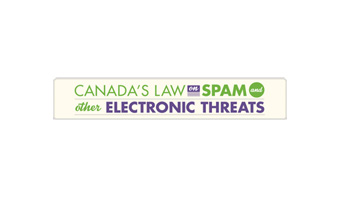
As of July 1, 2014, Canada’s Anti-Spam Legislation (CASL) is in force to regulate the distribution of commercial electronic messages (CEMs) and protect Canadians from unsolicited CEMs such as email, text messages and messages sent directly on social media platforms. One objective of CASL is to reduce electronic threats to commerce, including phishing, pharming, malware and spyware. All electronic messages must clearly identify the sender and include a way to unsubscribe.
Prohibitions under the new law:
- Sending CEMs without the recipient’s consent
- Altering the transmission of data in an electronic message to deliver it to a different destination without express consent
- Installing computer programs to a computer system without the express consent of the owner
- False or misleading statements online to promote a product or service
- Collecting personal information by accessing a computer system in violation of federal law
- Using computer programs to collect electronic addresses or the use of such addresses without permission.
The Canadian Radio-television and Telecommunications Commission, The Competition Bureau, and The Office of the Privacy Commissioner have each been mandated with the responsibility of enforcing the law.
Organizations or individuals who are affected by non-compliance of the law can bring a private right of action in court against the individual or organization they allege has violated the law. The private right of action will enable the applicant to seek damages. However, an individual or organization could be responsible for paying the legal fees incurred by the alleged violator if the claim proves to be improper or does not have any merit.
For Businesses and Organizations
CASL applies to all organizations, including charities and not-for-profit organizations. If you promote your business or organization, products or services, by using electronic channels, CASL may affect you.
For Individuals
Protect yourself, your electronic devices and your personal information by understanding and knowing how to recognize spam and other electronic threats.
Spam Reporting Centre
If you have been sent a CEM without your consent, and/or a CEM with false or misleading content, you can report it to the Spam Reporting Centre via fightspam.gc.ca.
For more information see the Government of Canada’s Anti-Spam Legislation.
Sign up for our e-Newsletter for the latest updates and case studies in employment law.
